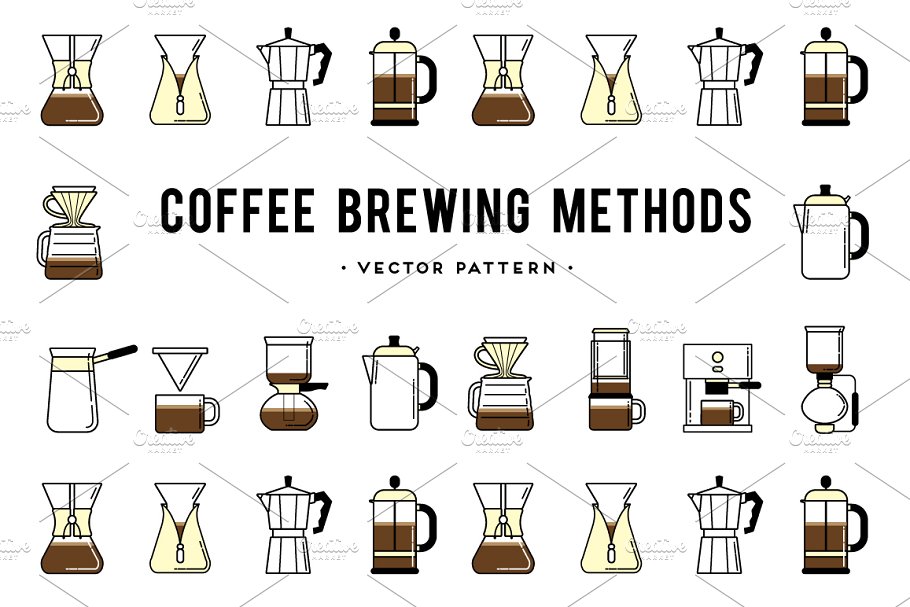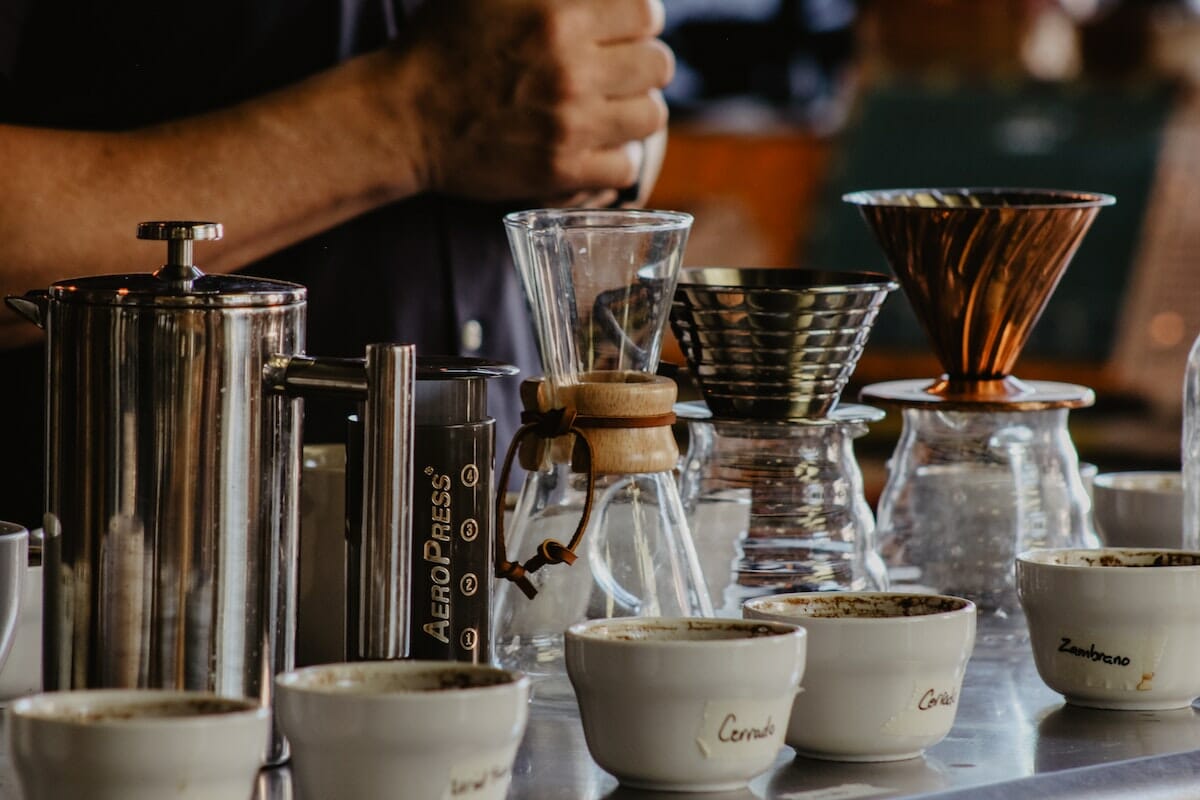Ingenious Coffee Brewing Methods to Boost Your Morning Habit
Ingenious Coffee Brewing Methods to Boost Your Morning Habit
Blog Article
The Scientific Research Behind Coffee Brewing: Exactly How Temperature Level and Time Affect Your Beverage
Recognizing the scientific research behind coffee brewing reveals that temperature level and time are not mere variables yet pivotal elements that determine the beverage's taste profile and general top quality. As we discover the subtleties of these aspects, the inquiry emerges: just how can one successfully equilibrium temperature and time to achieve that perfect brew?
The Chemistry of Coffee Removal
The chemistry of coffee extraction delves into the intricate procedures that change raw coffee beans into the fragrant drink enjoyed worldwide. This change largely entails the solubility of numerous substances existing in the beans, which are affected by aspects such as grind dimension, water quality, and the brewing method utilized.
Throughout the developing procedure, warm water functions as a solvent, extracting soluble compounds, including caffeine, sugars, lipids, and acids, from the coffee premises. Each compound adds to the taste profile, fragrance, and body of the last drink. Acids are liable for bright and zesty notes, while oils contribute to an abundant mouthfeel.
The first stages of brewing extract acids and sugars, leading to an enjoyable acidity, while long term extraction can lead to resentment due to over-extraction of undesirable compounds. Comprehending these chemical communications is important for optimizing developing techniques, as the balance between removal time and water temperature can significantly affect the general quality of the coffee.
Perfect Developing Temperatures
Discovering the right brewing temperature is crucial for unlocking the complete capacity of coffee tastes and fragrances - coffee brewing methods. Study shows that the optimum variety for brewing coffee lies in between 195 ° F to 205 ° F(90 ° C to 96 ° C) Within this range, the extraction procedure efficiently liquifies the desirable soluble substances in coffee beans, leading to a delicious and balanced mug
Brewing at reduced temperature levels, such as listed below 195 ° F(90 ° C ), may cause under-extraction, yielding an acidic and weak brew with low-key tastes. Conversely, developing at temperature levels exceeding 205 ° F(96 ° C) can bring about over-extraction, generating a bitter and rough preference due to the excessive dissolution of unfavorable compounds, such as tannins.
In addition, the ideal brewing temperature level can differ relying on the coffee bean type and roast level. For instance, lighter roasts commonly take advantage of somewhat greater temperature levels to boost their complex flavor profiles, while darker roasts might be better fit to reduced temperature levels to mitigate resentment.
Inevitably, keeping precision in developing temperature levels is crucial for achieving a harmonious balance of flavors, making certain that every cup of coffee delivers a gratifying sensory experience.
Effect of Brewing Time
Brewing time plays a crucial role in determining the taste profile and total high quality of coffee. Shorter developing times can result in under-extraction, leading to a sour or weak flavor, as not sufficient soluble substances are dissolved.
Ideal brewing time differs depending on the approach made use of and the grind size of the coffee. For example, a French press generally needs regarding 4 mins, while espresso removal is generally finished within 25 to 30 seconds. It is necessary to adjust brewing time in combination with other variables, such as water temperature level and coffee-to-water proportion, to attain the preferred flavor account.
Recognizing the influence of brewing time allows coffee fanatics to refine their developing strategies, ultimately boosting the sensory experience of their mug (coffee brewing methods). With careful interest to this variable, one can unlock the full potential of the coffee, exposing its special characteristics and nuances
Brewing Techniques and Their Results

As an example, methods like French press and cold brew enable a much longer steeping time, resulting in a fuller body and robust flavor because of raised removal of oils and soluble solids. Conversely, espresso brewing utilizes high pressure and a shorter removal time, generating a focused shot that emphasizes intense tastes and a rich crema.
Pour-over techniques, such as Chemex or V60, provide an even more regulated removal process, enabling the brewer to control circulation rate and water distribution, which can improve brightness and clearness. On the other hand, percolation approaches cycle water via the coffee grounds several times, bring about a more powerful, typically bitter taste.
Lastly, the use of paper filters versus metal filters can likewise influence the final preference; paper filters commonly yield a cleaner cup by trapping oils and great particles, while metal filters enable more oils to go through, adding to a fuller mouthfeel - coffee brewing methods. Understanding these nuances can elevate the coffee experience site link dramatically
Tips for Improving Your Brew
A well-executed mixture can change also the most basic coffee into an impressive experience. Grind the beans simply prior to making to take full advantage of quality, ensuring the grind size matches your brewing technique-- coarser for French press and finer for coffee.
Water top quality plays an important duty; usage filtered water without impurities. The ideal developing temperature varies between 195 ° F and 205 ° F(90 ° C to 96 ° C ) As well warm can burn the coffee, while also awesome may under-extract flavors.
Timing is similarly vital. For immersion methods, steeping for three to five mins is optimum, click reference whereas drip techniques commonly take around five minutes. Try out mixture times to locate your favored stamina.

Conclusion
In recap, the elaborate relationship in between temperature level and time is vital in the coffee developing process. Abiding by ideal brewing temperature levels in between 195 ° F and 205 ° F, along with specific timing tailored per approach, guarantees the desired taste profile is attained. Recognizing these clinical principles encourages individuals to improve their developing techniques, inevitably resulting in a more balanced and satisfying coffee experience. Mastery of these aspects is necessary for any kind of coffee lover seeking quality in their drink.
Understanding the scientific research behind coffee developing reveals that temperature level and time are not mere variables yet critical aspects that dictate the drink's flavor account and overall high quality. Understanding these chemical communications is important for optimizing brewing strategies, as the balance in between extraction time and water temperature can dramatically influence the total high quality of the coffee.Developing time plays a pivotal function in determining the taste profile and overall high quality of coffee. By concentrating on these aspects-- bean high quality, grind dimension, water temperature level, steeping time, and ratio-- you can raise your coffee brewing procedure, resulting in a consistently useful content exceptional mug.
In summary, the elaborate partnership between temperature and time is paramount in the coffee brewing procedure.
Report this page